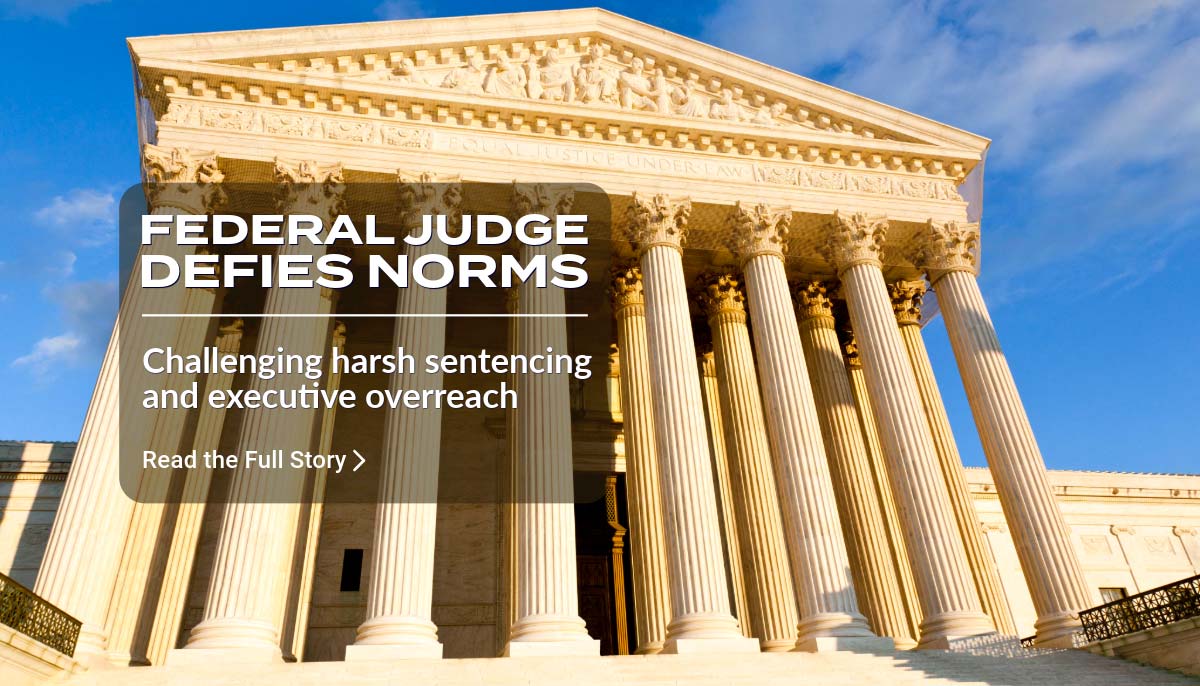
A Maverick on the Bench: Redefining Judicial Philosophy
In today’s legal climate, the national discourse often revolves around whether judges should adhere strictly to the letter of the law or interpret it in the context of evolving human values. Few judges exemplify the latter with such boldness and clarity as the Honorable John C. Coughenour of the U.S. District Court for the Western District of Washington. His decades-long career not only defies the norms of federal jurisprudence but also sheds light on the critical need for compassion and discretion in the courtroom.
From Reagan Appointee to Voice of Judicial Humanity
What makes Judge Coughenour truly extraordinary is the paradox at the core of his professional identity. Appointed in the 1980s by Republican President Ronald Reagan, one might expect Judge Coughenour to uphold conservative judicial values. Instead, he has become one of the most vocal critics of the federal sentencing guidelines introduced during that very era.
Describing these guidelines as “coldly algorithmic” and “inhumane,” Judge Coughenour has openly rejected the rigidity of mandatory minimums and sentencing tables. He argues that these inflexible rules strip the courtroom of its essential human element—context. According to him, when the law becomes robotic, justice suffers.
A Judge Who Rides Harleys and Visits Prisons
Beyond his judicial writings and rulings, Judge Coughenour lives the philosophy he preaches. He rides a Harley-Davidson, not to appear rebellious, but to stay grounded in the real world—far from the ivory towers of legal abstraction. Even more telling is his habit of visiting the very prisons where individuals he sentenced now reside. These visits aren’t ceremonial; they are reflections of his ongoing commitment to understanding the consequences of his rulings firsthand.
This rare level of accountability and empathy is nearly absent in the federal judicial system. It also underscores his unwavering belief that judicial power must be exercised with humanity and introspection, not detachment and deference to outdated formulas.
Breaking the Algorithm: Rejecting Federal Sentencing Mechanisms
Coughenour’s rebellion against the U.S. Sentencing Commission began in the mid-1980s and continues to this day. He views the system as an affront to the very role of a judge—to weigh, to consider, and to exercise judgment. In a now widely cited article from The Atlantic, the judge famously asked:
“Without discretion,
what’s the judiciary for?”
For him, sentencing is not about plugging variables into a spreadsheet. It’s about the individual, the circumstances, and the opportunity for redemption.
This belief echoes recent efforts across the judiciary, such as when a former federal judge urged clemency for a man he once sentenced to 55 years—a striking example of justice informed by reflection and humanity.
Standing Against Executive Overreach
In January 2025, Judge Coughenour once again stepped into the national spotlight. In a landmark ruling, he temporarily blocked an executive order issued by former President Donald Trump that aimed to strip U.S. citizenship from children born to undocumented immigrants.
Calling the executive action “blatantly unconstitutional,” Judge Coughenour reaffirmed the judiciary’s role as a bulwark against governmental overreach. In doing so, he didn’t just interpret the Constitution—he defended it. His decision reflected both a deep understanding of constitutional law and a courageous willingness to challenge powerful political interests.
The Last of an Endangered Judicial Species?
In a time when many judges are pressured to conform to political ideologies or reduce their roles to that of bureaucratic enforcers, Judge John Coughenour stands apart. He embodies what it means to be a judge—not just a legal technician, but a steward of justice.
His philosophy poses a fundamental challenge to the system: Should judges serve algorithms, or should they serve people?
Why Judge Coughenour Matters Now More Than Ever
As debates rage over immigration policy, criminal justice reform, and executive authority, voices like Judge Coughenour’s offer something sorely missing—moral clarity wrapped in legal precision. His work reminds us that the judiciary isn’t a machine—it’s a human institution, powered by values, context, and compassion.
In a time when judicial independence faces increasing threats, and when legislative gridlock often places complex decisions in the hands of the courts, Coughenour’s legacy is a guiding light. He shows that courage and conscience still have a place on the bench.
Final Thoughts: A Judicial Legacy Rooted in Integrity
Judge John C. Coughenour may never seek the limelight, but his actions demand attention. Whether he’s riding into court on a Harley or striking down unconstitutional laws with the pen, he represents the rare kind of judge who values judgment over rigidity, empathy over efficiency, and the Constitution over politics.
In an age of polarized courts and mechanical jurisprudence, his example is not only refreshing—it’s essential.












